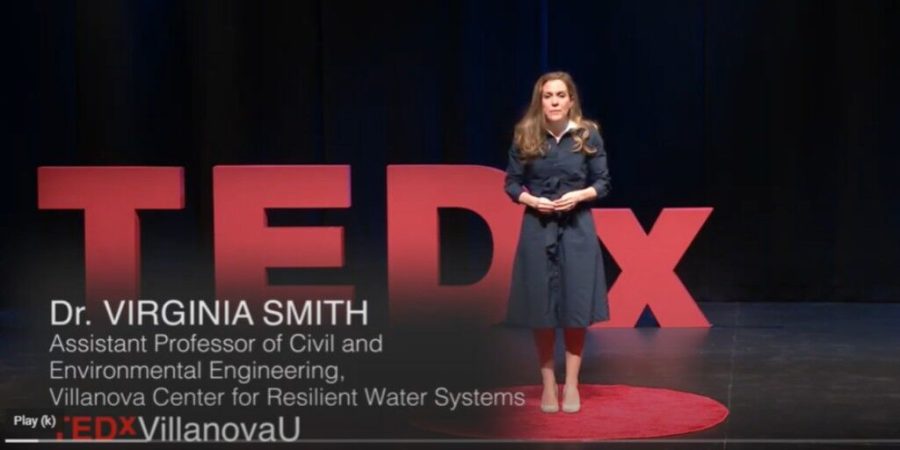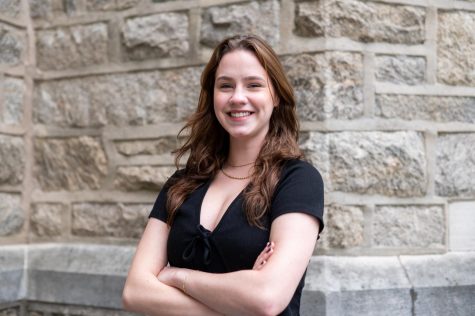TEDxVillanovaU Talk Addresses the Issue of Flooding
Dr. Virginia Smith speaks about the effects of major flooding.
September 13, 2021
Residents of Pennsylvania and other states across the U.S. experienced severe damage from Hurricane Ida as it crossed the East Coast. At least 43 people were reported dead in New York, New Jersey, Pennsylvania and Connecticut, while hundreds of thousands of homes were left without power.
Such a storm has sparked a larger conversation about flooding and its damaging effects. Assistant professor and Director of Sustainability Studies Minor and Sustainable Engineering Minor Virginia Smith, Ph. D. in the College of Engineering spoke about the issue of flooding in her TED talk during the TEDxVillanovaU event in March 2021. In the talk titled, “Shifting the Flood Paradigm,” Smith speaks about how urban growth has led to degradation of natural water systems. Such degradation has left vulnerable communities at risk during storms and with extreme repair costs after storms.
Smith began her talk by setting the scene of month-long flooding that she experienced while researching in Sierra Leone. She touched upon the powerless feeling of being caught in a flood and the statistics that show the majority of individuals have been affected in some way by this common natural disaster.
Smith goes on to mention the economic costs associated with flooding. She compares global damage costs to the price of groceries for families in the U.S. Flood recovery costs in 2010 were equivalent to the cost of feeding 20% of the U.S. By the year 2030, the percentage will increase to 77 and continue to rise.
“That’s a lot of money. I am talking in terms of groceries because that is something I can wrap my head around,” Smith said in her talk. “But that money can go to anything. The national debt. Healthcare. Education. Back to the citizens. We can do a lot.”
Smith further explains that the research behind flooding allows civil engineers to be able to pinpoint where floods will occur and how severe they will be. The problem forms in the development of housing and cities near large water sources such as oceans and rivers. Humans need water, but that also puts us at risk when it overflows in storms such as Hurricane Ida. Cities have been growing for decades and as more of the population flocks to urban centers, landscapes change. This shift results in more stormwater runoff, a decrease in water quality and greater impacts due to floods.
Although techniques are set in place to deal with floods, the fast growth of urban populations reduces the effectiveness of traditional approaches.
Besides solutions becoming outdated, low-income populations continue to be impacted more harshly in floods. Smith explains that low-income and unsanctioned housing is generally located in areas with elevated flood risks. The damage costs then affect these populations further and create a cycle of economic issues.
Outside of her TED talk Smith explained that wealthier neighborhoods are often on higher grounds and therefore at less risk of flooding during heavy rain periods.
“Historically in a lot of cities there is environmental racism,” Smith explains. “We have to think about how to structure stormwater around that. It is not really an issue of equitable distribution cause some places just have greater challenges. How do you identify that and understand that a little bit deeper?”
Professors in the University’s College of Engineering are currently aiming to research this issue. In a program known as the Villanova Center for Resilient Water Systems (VCRWS), engineering researchers work to create solutions to global water challenges, such as those associated with flooding. Although the issue of sustainable stormwater management is a global one, the University has projects in place to test the effectiveness of solutions. Projects include the Bio Infiltration Traffic Island which is a rain garden located on West Campus, “The Commons” project which includes nine rain gardens, the Constructed Stormwater Wetland which treats over 42 acres of stormwater runoff on campus and the I-95 PennDOT Project that deals with stormwater runoff on the interstate.
The results of such projects can further advise other areas on how to manage stormwater and floods equitably and effectively.
Smith, alongside other professors, will also be writing the StormWater Manual for the state of Pennsylvania. This work can help advise local governments and policy makers about new solutions to flooding and how to do better for community members.
In her TED talk, Smith advises viewers to get involved as well. Research can provide evidence for solutions but community members, students and anyone looking to make a difference can excel progress by using their voice and staying educated on such issues.
“The great thing about being a professor is that you get to work with the next generation that is going to find solutions,” Smith said outside of her TED talk. “I think this is a problem not only facing engineers but all of us. My goal for this topic would be to inspire people to start thinking about these big issues and push them ahead.”
Students at the University can get involved with the Student Sustainability Committee or Environmental Group to learn more about such issues and begin to act. There is also a Climate Change Panel being held on Sept. 23.
“The time to act is now,” Smith advises.
The full TED talk, “Shifting the Flood Paradigm,” can be found on the TEDx Talks YouTube channel or the Ted Talk website.



